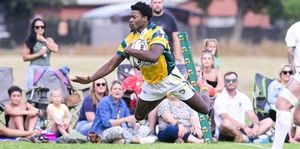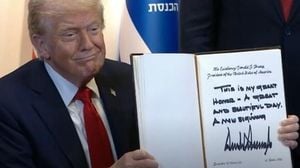When the NFL announced on September 28, 2025, that Puerto Rican superstar Bad Bunny would headline the Super Bowl LX halftime show, the reaction was instant and explosive. For millions of fans, the choice was a celebration: Bad Bunny, one of the world’s most streamed artists, would bring his signature reggaeton and Latin trap sound to the biggest stage in American sports. But what might have been a simple pop culture milestone quickly became a flashpoint in the nation’s ongoing culture wars, exposing deep divisions over identity, language, and belonging in the United States.
On one side, Bad Bunny’s supporters hailed the move as historic. His performance will be the first Super Bowl halftime show delivered entirely in Spanish—a point of pride not only for the artist himself but also for the millions of Latinos across the country who rarely see themselves represented at such a high-profile event. As Rolling Stone reported, Bad Bunny said in a statement, “What I’m feeling goes beyond myself. It’s for those who came before me and ran countless yards so I could come in and score a touchdown … this is for my people, my culture, and our history. Ve y dile a tu abuela, que seremos el HALFTIME SHOW DEL SUPER BOWL.”
Yet, the announcement also unleashed a tidal wave of backlash from conservative commentators and politicians. House Speaker Mike Johnson called the NFL’s decision a “terrible decision,” while former President Donald Trump dismissed it as “absolutely ridiculous.” Trump, speaking on Newsmax, said, “I never heard of him. I don’t know who he is. I don’t know why they’re doing it, it’s crazy... I think it’s absolutely ridiculous.” Marjorie Taylor Greene, another prominent right-wing voice, labeled the selection “perverse” and “demonic.” The criticism wasn’t just about musical taste—it cut to questions of culture, language, and national identity.
Critics seized on the fact that Bad Bunny’s music is almost entirely in Spanish and that he’s been outspoken about Puerto Rican independence and U.S. immigration policies. MAGA-aligned commentators on social media argued that a Spanish-language performance had no place at the Super Bowl, with YouTuber Benny Johnson writing, “The NFL is self-destructing year after year.” Others, like conservative commentator Greg Price, pointed to Bad Bunny’s refusal to tour in the U.S. due to fears of ICE targeting Latino fans as evidence of his supposed anti-Americanism.
Bad Bunny, whose real name is Benito Antonio Martínez Ocasio, is a U.S. citizen by birth—Puerto Rico is a U.S. territory—but his embrace of Latin identity and political activism have made him a lightning rod for controversy. In an interview with i-D, he explained his decision to skip U.S. dates on his recent world tour: “There was the issue of—like, fucking ICE could be outside [my concert]. And it’s something that we were talking about and very concerned about.” His concerns were not unfounded. According to IOL Entertainment, Trump-aligned officials threatened to have ICE present at the Super Bowl. Corey Lewandowski, a former Trump adviser, warned, “There is nowhere you can provide safe haven to people who are in this country illegally—not the Super Bowl, not anywhere else.” Homeland Security Secretary Kristi Noem echoed the sentiment, stating that ICE agents would be deployed and that “only law-abiding Americans” should attend the event.
In response to the NFL’s choice, Turning Point USA (TPUSA), a conservative activist group co-founded by Charlie Kirk, announced its own “All American Halftime Show” as a direct counterprogramming effort. The organization, which has built its brand on “culture war” politics, marketed the event as a patriotic alternative to what it called “woke entertainment,” promising musical acts that would celebrate “faith, family, and freedom.” Supporters of TPUSA’s move saw it as a stand against what they perceive as the erosion of traditional American values, while critics dismissed it as reactionary and exclusionary.
The controversy even spilled over into the world of sports rumors. On October 13, 2025, a viral social media post falsely claimed that Kansas City Chiefs quarterback Patrick Mahomes had vowed to boycott the Super Bowl if Bad Bunny performed. The post, which amassed over 237,000 likes and 25,000 comments within hours, quoted Mahomes as saying, “I won’t play if they let Bad Bunny on that stage. This is the Super Bowl, not a circus.” However, fact-checkers from The Latin Times and other outlets confirmed there was no credible evidence Mahomes ever made such a statement or threatened a boycott. Mahomes himself has remained silent on the issue, focusing his public attention on football. The rumor, which spread primarily through MAGA-aligned Facebook pages, serves as a stark reminder of how quickly misinformation can take hold in a polarized environment.
Bad Bunny, for his part, has largely responded to the backlash with humor and pride. During his October 4, 2025 appearance as host of Saturday Night Live, he joked that critics had “four months to learn” Spanish before the big show. He also delivered an earnest message in both English and Spanish: “I’m very excited to be doing the Super Bowl, and I know that people all around the world who love my music are also happy. Especially all the Latinos and Latinas in the whole world, and here in the United States, all the people who have worked to open doors, more than I have achieved, who have achieved everything, demonstrating that our way, our carrying of this country, no one can ever remove nor erase.”
This isn’t the first time a Latin artist has taken center stage at the Super Bowl. Jennifer Lopez and Shakira’s 2020 halftime performance was widely celebrated as a showcase of Latino crossover appeal. But the contrast with today’s uproar is striking. What was once seen as a moment of inclusion is now the subject of heated debate, with some seeing Latin performance as a threat rather than a celebration.
The uproar over Bad Bunny’s Super Bowl halftime show is about much more than music. It’s a reflection of the broader fractures in American society—fractures over race, language, immigration, and who gets to define what it means to be “American.” These debates have only intensified since Donald Trump’s presidency, which saw a sharp rise in anti-immigrant rhetoric, hate crimes, and institutional pressure on Latino communities. As civil rights groups and media organizations have documented, the climate for Latinx Americans has grown more hostile, with cultural flashpoints like the Super Bowl halftime show serving as battlegrounds for competing visions of the country’s future.
With the Super Bowl still months away, the debate shows no sign of dying down. As Bad Bunny prepares to make history on one of the world’s biggest stages, the question of who belongs—and who gets to be heard—remains front and center in the American conversation.




